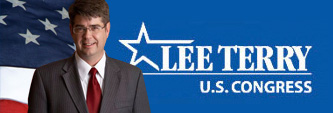September 7, 2012
TERRY WINS KEY SMALL BUSINESS ENDORSEMENT; RENEWS CALL TO EXTEND ‘SENSIBLE TAX RELIEF’
Rep. Lee Terry today gained the support of the nation’s largest small business organization, the National Federation of Independent Business (NFIB).
The announcement was made at First Edition Printing Company, a longtime printing operation located in the Benson neighborhood of Omaha. The company’s owner, John Pinkerton, stood with Terry and explained his support.
“Lee Terry has been there for small businesses time and time again,” Pinkerton said. “We need him returned to Congress so that he can continue to fight for policies that will create good, permanent private sector jobs.”
Terry said he was honored to receive the NFIB endorsement and drew attention to a major difference between the two candidates on the issue of taxes.
“There is a big difference between John Ewing and me on the issue of taxes. I support extending the current program of sensible tax relief. My opponent does not. His position would result in massive tax increases on individuals, families and small businesses, something that couldn’t come at a worse time,” Terry said.
The nation faces a “Taxmageddon” on January 1, 2013, when current middle-class and small business tax cuts enacted in 2001 and 2003 expire. Without an extension, a typical middle class family in Nebraska’s second district will pay between $1,600 and $2,200 in higher taxes starting next year. Nationally, 114 million families will be hit with increased tax liability of $166 billion in 2013.[1] Terry voted on August 1 to extend the tax relief provisions.
Ewing set his position on the issue in an Omaha World-Herald story published the day before he formally entered the race for Congress last summer. The article stated Ewing supports “. . . increases in revenue, notably by rolling back Bush’s tax cuts of 2001 and 2003 . . .”. [2] The article also said Ewing would be “pushing for the repeal of former President George W. Bush’s tax cuts.”
One key tax relief provision allows small businesses to write-off up to $139,000 in business equipment annually on their taxes, a key incentive for them to upgrade and modernize their physical plant. Without an extension, the maximum expensing a small business could claim will drop to $25,000 a year—an 82 percent cut.
“My opponent wants to drastically reduce a small business’ ability to invest and remain competitive. His position makes absolutely no sense and will cost us jobs,” Terry said.
The 2001 and 2003 provisions lowered taxes on wage earners, families with children, small businesses and seniors who depend on investment or dividend income to make ends meet.
The ramifications of Ewing’s tax increase are stark: every tax bracket would increase next year—meaning every taxpayer will pay more. The child tax credit would be cut in half, falling from $1,000 per child now to $500. Dividend and investment income tax rates would skyrocket, hitting seniors’ hardest. Small businesses will be particularly hard-hit as many owners file tax returns as individuals.
[1] The Hill newspaper, news story, “White House warns of $1,600 tax hike on 114M middle-class families,” by Jonathan Easley, July 24, 2012. Joint Committee on Taxation, “Estimated Budget Effects of the Tax Relief, Unemployment Insurance Reauthorization and Job Creation Act of 2010,” December 10, 2010.







